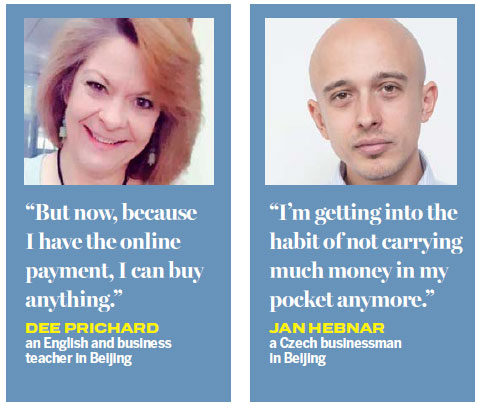Apps aiding foreigners with internet shopping
But language barrier remains a stumbling block to uptake of online payment services
Dee Prichard has lived in China for four years and started shopping with WeChat Wallet, an online payment service, about 12 months ago.
"It makes it easier for me to use JD.com," she says, referring to the popular online shopping site. "Before, when I tried to use JD.com, I had to look for products that allowed me to pay on delivery. But now, because I have the online payment, I can buy anything."

Prichard, an English and business teacher from the US, shops online about three times a week. Except for clothes, she buys everything online.
"Honestly, before I go shopping, I look online first. If I can find it online, I buy it," she says.
At first, she used online payment only when shopping online, but later she discovered that it could be used for many things in the real world.
"At a local vendor where I buy beef, it was kind of a surprise to me when she said she also accepts mobile payment," Prichard says, adding that she's become accustomed to asking at every store whether they accept WeChat Wallet.
The growth in online payment has also transformed the life of Czech businessman Jan Hebnar.
"I transfer money to my friends online, pay for dinners, lunches, and so on, whenever it's possible," he says. "I'm getting into the habit of not carrying much money in my pocket anymore."
Hebnar is a managing partner of CEE Investment and Trade, a company that imports food products from Central European and sells them to Chinese consumers on the internet. He says he started to use online payment in 2012 after opening his first shop on Taobao, an online marketplace operated by Alibaba Group.
"Online payment smoothes e-commerce a lot," he says, adding that Taobao also forward payment immediately to a vendor's account, whereas websites such as JD.com or Amazon hold on to the money for a period of time. "For example, JD.com will then send the money 60 to 90 days after payment."
Compared with China, he adds, online payment is used much less in his native Czech Republic.
"It's because the penetration of credit and debit cards is much higher than in China, so the adoption of this new technology is slower," Hebnar says. "In China, online payments basically replaced debit cards before they were made available to the majority of Chinese."
According to Analysys, a Beijing internet consultancy, WeChat Wallet has 300 million monthly active users and is available at more than 300,000 retailers in China, while Alipay has 200 million monthly active users and works with about 1 million retailers.
Wang Pengbo, an analyst for Analysys, says the sprawling development of online payment echoes the developments in e-commerce and smartphone penetration in China. It is forecast that the number of smartphone users in China will reach 740 million next year.
"Online payment giants are competing to make their services available in offline stores, which has brought great convenience to users and catalyzed the market's development," Wang says.
For foreigners, however, the biggest problem with online payment apps is the language barrier.
Prichard says one of her colleagues helped to set up her WeChat Wallet, but she found it difficult to get any English instructions for Alipay.
"If a foreigner needs to ask for help so many times, it's a little embarrassing," she says. "If I could use Alipay, I'd use Taobao more."
The problem is also true with other Chinese apps. "I've downloaded several apps, but there is no way to change languages," Prichard says. "I have many foreign friends who have all asked the same questions - does anybody know how to use this app?"
For example, Jenny Lou's, a Beijing supermarket specializing in imported foods, has an app that advertises promotions and enables shoppers to buy online. "But it is all in Chinese," Prichard says.
Hebnar adds that he doesn't use many other Chinese apps due to the same problem.
lijing2009@chinadaily.com.cn
























